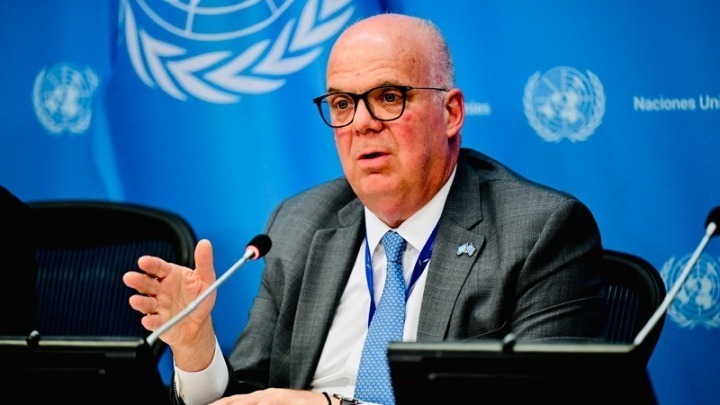Sekeris: Maritime security the main issue of the Greek presidency of the Security Council

The Greek Permanent Representative to the United Nations, Ambassador Evangelos Sekeris, gave a press conference to UN correspondents after Greece assumed the presidency of the Security Council for the month of May.
Sekeris outlined the Security Council’s work program for the month, emphasizing maritime security and the protection of civilians.
He detailed the agenda, key priorities and scheduled meetings. He also answered questions from correspondents on issues of concern to the Security Council.
“ This is the third consecutive presidency of the Security Council by an EU member state, after Denmark and France,” emphasized the Permanent Representative of Greece, underlining institutional continuity.
The Greek presidency aims for greater transparency and efficiency, as well as more participatory decision-making processes.
The briefing began with a reference to World Press Freedom Day (3 May). Greece, as co-chair of the Group of Friends for the Protection of Journalists (together with France and Lithuania), will issue a relevant statement commemorating the day.
“ We pay tribute to all journalists and media workers who lost their lives in the line of duty,” noted Sekeris, reiterating Greece’s commitment to defending their rights.
Main event of the Greek Presidency - Maritime Security
May 20 will be the day of the thematic event of the Greek Presidency, entitled: “ Enhanced Maritime Security through International Cooperation for Global Stability”.
The discussion will be chaired by Greek Prime Minister Kyriakos Mitsotakis, with keynote speakers including UN Secretary-General Antonio Guterres and the President of the Union of Greek Shipowners, Melina Travlou.
“ We have raised the event at a high level in order to underline Greece’s interest in this very important issue”, noted Sekeris. The approach, he said, will be “ holistic”, focusing on freedom of navigation, supply chains and international cooperation.
High-Level Discussion - The Protection of Civilians
A ministerial-level discussion on the protection of civilians in armed conflict will be held on 22 May, chaired by Greek Foreign Minister George Gerapetritis.
“ We also want to highlight the gender dimension in the protection of civilians,” said Sekeris.
Responding to a question from the Athens-Macedonian News Agency on how Greece sees the role of UNCLOS in addressing current threats to maritime security, especially in areas where disputes arise such as the Eastern Mediterranean or the Red Sea, Sekeris underlined that “ for Greece, maritime disputes should be resolved through the implementation of UNCLOS.”
“ One of the reasons why we organized this event on maritime security is precisely to show the importance it has for international law, especially for the international law of the sea. And, of course, we believe that maritime disputes should be resolved through the implementation of UNCLOS.
You also know - which is very important - that last September the leaders of the UN member states adopted the Pact for the Future, which is a non-binding legal document, but with significant political significance, where there are two provisions on maritime security. And a direct reference to international law and the law of the sea and UNCLOS. So, we could say that UNCLOS enjoys a broad consensus on its importance.
So, this is something that will be highlighted in the debate that we will have on May 20. For the Red Sea there is also a resolution, 2768 of 2025, which Greece actually drafted together with the United States. In this resolution, the importance of maritime security, the protection of global supply chains and economic developments based on the international law of the sea is underlined.
"I think there is a growing consensus about the importance of UNCLOS, in fact, that all maritime disputes should be settled in accordance with this very important treaty," he said.

